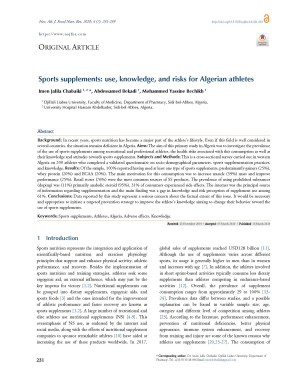Sports supplements: use, knowledge, and risks for Algerian athletes
Abstract
Background: In recent years, sports nutrition has become a major part of the athlete’s lifestyle. Even if this field is well considered in several countries, the situation remains deficient in Algeria. Aims: The aim of this primary study in Algeria was to investigate the prevalence of the use of sports supplements among recreational and professional athletes, the health risks associated with this consumption as well as their knowledge and attitudes towards sports supplements. Subjects and Methods: This is a cross-sectional survey carried out in western Algeria on 200 athletes who completed a validated questionnaire on socio-demographical parameters, sports supplementation practices, and knowledge. Results: Of the sample, 100% reported having used at least one type of sports supplements, predominantly gainers (25%), whey protein (20%) and BCAA (20%). The main motivation for this consumption was to increase muscle (59%) mass and improve performance (25%). Retail stores (76%) were the most common sources of SS products. The prevalence of using prohibited substances (doping) was (11%) primarily anabolic steroid (95%). 31% of consumers experienced side effects. The internet was the principal source of information regarding supplementation and the main finding was a gap in knowledge and risk perception of supplement use among 61%. Conclusions: Data reported by this study represent a serious concern about the factual extent of this issue. It would be necessary and appropriate to initiate a targeted prevention strategy to improve the athlete’s knowledge aiming to change their behavior toward the use of sports supplements.
Full text article
Authors
Copyright (c) 2020 Authors

This work is licensed under a Creative Commons Attribution 4.0 International License.
-
Attribution — You must give appropriate credit, provide a link to the license, and indicate if changes were made. You may do so in any reasonable manner, but not in any way that suggests the licensor endorses you or your use.
-
No additional restrictions — You may not apply legal terms or technological measures that legally restrict others from doing anything the license permits.





